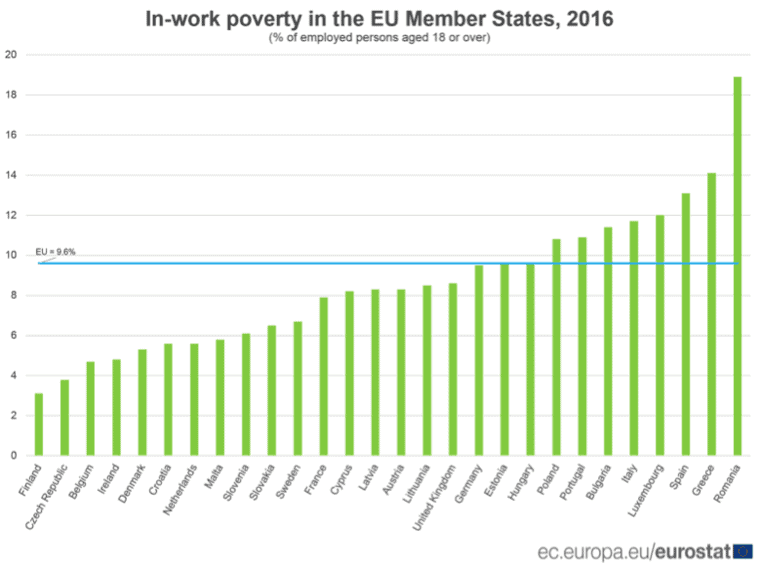
Georgios Koulouris
With the onset of the economic crisis since 2008, a new term, the working poor, has emerged at European level. This new “class” features a portion of the population that, although working, is paid below the relative poverty line. The working poor is closer to the European poverty indicator, the relative poverty which is assessed at an income below 60% of the national average national.
One of the main reasons for the growth of this phenomenon was the sharp increase in unemployment, the rise in part-time working and austerity measures as a repercussion of the economic recession. The working poor issue requires more attention not only for the amelioration of living standards but also for the fight against social exclusion which is one of the biggest threats posed by poverty.
The following graph from Eurostat depicts with clarity the problem of working poor in the European Union, with the countries of the Balkans and South Europe showing the biggest percentage:

For this reason EU should devise effective measures and tailor-made policies to erase the issue of working poor in its member states and meet their needs.
EU should undertake policies and initiatives to tackle the phenomenon of working poor
Within this context, EU has set the target, through the Europe 2020 Strategy, of reducing the numbers of poor people by 20m, paying particular attention to employment, education and training. Both the European Social Fund and the European Strategic Investment Fund seek to create new jobs and reintegrate young people into either education or training programs.
However, in order to improve the standard of living of that section of the population that while working is on the poverty line and cannot fulfill its basic daily needs and activities, these tailor-made measures and initiatives could include some of the following:
Digital skills are crucial for employees
Since one of the variables affecting working poor is education, more emphasis should be given to improving the educational attainment of the working poor. Education plays a fundamental role in the fight against social exclusion. For this reason, access to lifelong learning and vocational education programs according to the needs of the labour market, with emphasis on digital skills, will enhance the skills of employees to adapt to more and different working environments. It should be mentioned that estimates show that around 40% of people in the EU workforce do not have adequate digital skills; 14% have no digital skills at all. Given that the digital economy will dominate in the upcoming years, those skills are crucial for the employees.
European Social Rights Pillar
Furthermore, strengthening the welfare state with the guarantee of a living wage, access to healthcare, better working conditions, social benefits and the protection of part-time, temporary, precarious and undeclared workers should be a priority. The EU, through the European Social Rights Pillar, aims to build a fairer and more socially inclusive EU. The three main categories are: equal opportunities and access to employment, fair working conditions and social protection and inclusion. Under this framework, the fight against the phenomenon of working poor should be driven institutionally.
Sustainable Development Goal 8
The EU should also act in accordance with the Sustainable Development Goal 8: “Promote sustained, inclusive and sustainable economic growth, full and productive employment and decent work for all”. Within this framework, the EU should boost investments in areas that could assist growth, depending on the specific needs of each individual country but based on the above-mentioned employment criteria.
Single-earning households
Another great issue is single parents or families with children and one employee in the household that are at risk of poverty. In these cases a proper work-life balance plan is needed (including childcare services) to facilitate access to work for these parents. In some cases, the lack of childcare services reduces the job-seeking opportunities or the full working day of single parents, and increasing the risk of poverty for them.
Consequently, it may be inferred that job creation is not the only pathway to tackle and reduce the poverty or unemployment rate as the sheer scale of the working poor indicates that a series of measures and policies are still needed to ensure quality, stable and decent work. In order to reduce social exclusion and improve the standard of living of working poor, urgent measures and tailor-made policies should be taken by EU both at institutional and individual level.
Political Scientist based in Athens, working as Consultant/Communication Assistant at a management & consulting firm. His interests focus on social inclusion, education, employment, minority and human rights. He holds a degree in International & European studies from University of Piraeus and a Master of Arts on Sustainable Development